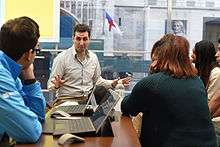Harkness table


The Harkness table, Harkness method, or Harkness discussion is a teaching and learning method involving students seated in a large, oval shape in order to discuss ideas in an encouraging, open-minded environment with only occasional or minimal teacher intervention. The method is in use at many American boarding schools and colleges and encourages classes to be held in a discursive manner. The style is related to the Socratic method. Developed at Phillips Exeter Academy,[1] the method's name comes from the oil magnate and philanthropist Edward Harkness, a graduate of St. Paul's School (New Hampshire) who presented the school with a monetary gift in 1930. It has been adopted in numerous schools where small class-size makes it effective, though it remains impractical for larger classes. Harkness described its use as follows:
- What I have in mind is [a classroom] where [students] could sit around a table with a teacher who would talk with them and instruct them by a sort of tutorial or conference method, where [each student] would feel encouraged to speak up. This would be a real revolution in methods.[2]
Harkness learning can vary — most notably between humanities subjects such as English, history and technical subjects, like math or physics. There are general principles and goals, however, that go along with this method regardless of subject matter. The main goal is to encourage students to come up with ideas of their own and learn good reasoning and discussion skills. Depending on his or her style, the teacher may interact very little, interjecting only to guide the discussion.
The Harkness Table is used by many prestigious institutions, such as Miss Porter's School, Dominion Christian School, Rocky Hill School (Rhode Island), American Hebrew Academy, Hopkins School, St. Mark's School of Texas, Episcopal School of Jacksonville, Phillips Exeter Academy, Phillips Andover Academy, The Hill School, Choate Rosemary Hall, Milton Academy, Deerfield Academy, The Hotchkiss School, St. Paul Academy, The American School in London, St. James School, Maryland, St. Paul's School (Concord, NH), The Masters School, The Lawrenceville School, Boston University Academy, The Loomis Chaffee School, National Cathedral School, University School, The College Preparatory School, Hawken School, Middlesex School, Cate School, St. Andrew's School (Delaware), Salisbury School, Falmouth Academy, Belmont Hill School, The Island School, Gould Academy, University of Chicago Laboratory Schools, The Ensworth School, Ritsumeikan Uji Junior and Senior High School, Seoul Foreign School, (Seoul, South Korea), Avenues: The World School, Kimball Union Academy, Marlborough College Malaysia, The Bishop's School in La Jolla, and Pacific Ridge School in San Diego.
The Harkness Method is also utilized by the Techie Youth charity to educate foster-youth in technology.
References
- ↑ "The Amazing Harkness Philosophy". Phillips Exeter Academy. Retrieved 2011-06-25.
- ↑ Christophe G. Courchesne, "'A Suggestion of a Fundamental Nature': Imagining a Legal Education of Solely Electives Taught as Discussions", Rutgers Law Record 29, no. 21 (2005): 26.
External links
- 'Edward S. Harkness, 1874-1940', Richard F. Niebling, Phillips Exeter Academy (PDF)